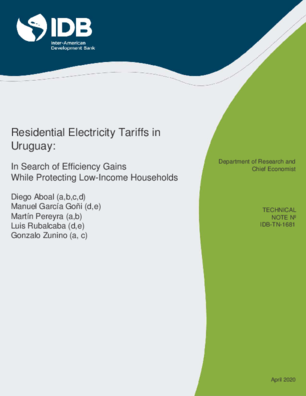Residential Electricity Tariffs in Uruguay: In Search for Efficiency Gains while Protecting Low-Income Households
Date
Apr 2020
Prices transmit information and guide consumption and production decisions. In electricity markets prices usually do not reflect marginal costs of production, and therefore there are opportunities for efficiency gains by rebalancing tariffs. The objective of this paper is twofold. The first goal is to assess the inefficiencies of existing residential electricity tariffs in Uruguay, and some possible long-term consequences for the public electricity companys finances if they are not corrected. The second goal is to study alternative pricing mechanisms that avoid incentives for inefficient behavior, while protecting low-income households. The estimated deadweight loss under the current tariff structure and residential electricity consumption is estimated at 1.2 percent of the total consumer surplus (USD 37 million).




